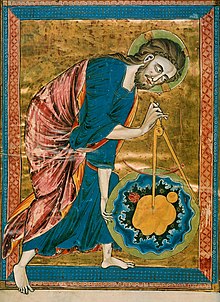
Back Quadrívium AN تعاليم (علوم) Arabic Quadrivium AST Квадрывіюм BE-X-OLD Квадривиум Bulgarian Quadrívium Catalan Quadriviu Corsican Kvadrivium Czech Quadrivium German Quadrivium Greek

From the time of Plato through the Middle Ages, the quadrivium (plural: quadrivia[1]) was a grouping of four subjects or arts—arithmetic, geometry, music, and astronomy—that formed a second curricular stage following preparatory work in the trivium, consisting of grammar, logic, and rhetoric. Together, the trivium and the quadrivium comprised the seven liberal arts,[2] and formed the basis of a liberal arts education in Western society until gradually displaced as a curricular structure by the studia humanitatis and its later offshoots, beginning with Petrarch in the 14th century. The seven classical arts were considered "thinking skills" and were distinguished from practical arts, such as medicine and architecture.
The quadrivium, Latin for 'four ways',[3] and its use for the four subjects have been attributed to Boethius, who was apparently the first to use the term[4] when affirming that the height of philosophy can be attained only following "a sort of fourfold path" (quodam quasi quadruvio).[5]: 199 . It was considered the foundation for the study of philosophy (sometimes called the "liberal art par excellence")[6] and theology. The quadrivium was the upper division of medieval educational provision in the liberal arts, which comprised arithmetic (number in the abstract), geometry (number in space), music (number in time), and astronomy (number in space and time).
Educationally, the trivium and the quadrivium imparted to the student the seven essential thinking skills of classical antiquity.[7] Altogether the Seven Liberal Arts belonged to the so-called 'lower faculty' (of Arts), whereas Medicine, Jurisprudence (Law), and Theology were established in the three so-called 'higher' faculties.[8] It was therefore quite common in the middle ages for lecturers in the lower trivium and/or quadrivium faculty to be students themselves in one of the higher faculties. Philosophy was typically neither a subject nor a faculty in its own right, but was rather present implicitly as an 'auxiliary tool' within the discourses of the higher faculties, especially theology;[9] the separation of philosophy from theology and its elevation to an autonomous academic discipline were post-medieval developments.[10]
Displacement of the quadrivium by other curricular approaches from the time of Petrarch gained momentum with the subsequent Renaissance emphasis on what became the modern humanities, one of four liberal arts of the modern era, alongside natural science (where much of the actual subject matter of the original quadrivium now resides), social science, and the arts; though it may appear that music in the quadrivium would be a modern branch of performing arts, it was then an abstract system of proportions that was carefully studied at a distance from actual musical practice, and effectively a branch of music theory more tightly bound to arithmetic than to musical expression.[citation needed]
- ^ Kohler, Kaufmann. "Wisdom". Jewish Encyclopedia. Retrieved 2015-11-07.
- ^ Gilman, D. C.; Peck, H. T.; Colby, F. M., eds. (1905). . New International Encyclopedia (1st ed.). New York: Dodd, Mead.
- ^ "Quadrivium (education)". Britannica Online. 2011. EB.
- ^ Fried 2015, p. 2.
- ^ Stahl, W. H. (6 November 1978). Roman Science: Origins, Development, and Influence to the Later Middle Ages. Praeger. ISBN 978-0-313-20473-9.
- ^ Gilman, Daniel Coit, et al. (1905). New International Encyclopedia. Lemma "Arts, Liberal".
- ^ Onions, C.T., ed. (1991). The Oxford Dictionary of English Etymology. p. 944.
- ^ By way of example, until well into the 1970s, the faculty of Medicine of the University of Würzburg (Germany) was still officially referenced as a 'Hohe Fakultät' by its doctoral students in their written doctoral dissertations.
- ^ 'Philosophia ancilla theologiae'
- ^ This separation is partly attributable to topical developments within philosophy itself, and due in part to Martin Luther's rejection of philosophy as 'useless for theology' as the Protestant Reformation evolved.
© MMXXIII Rich X Search. We shall prevail. All rights reserved. Rich X Search